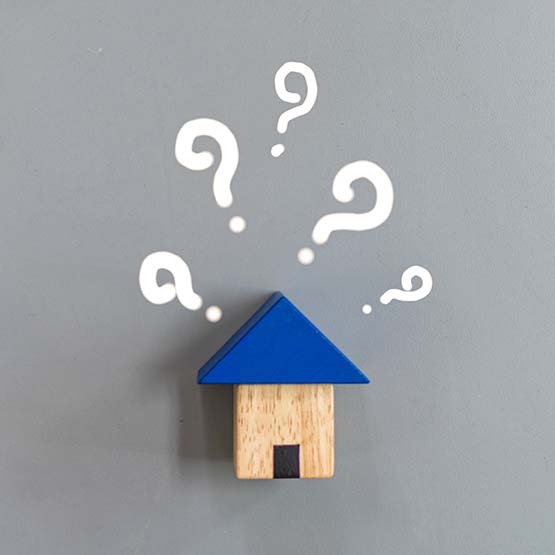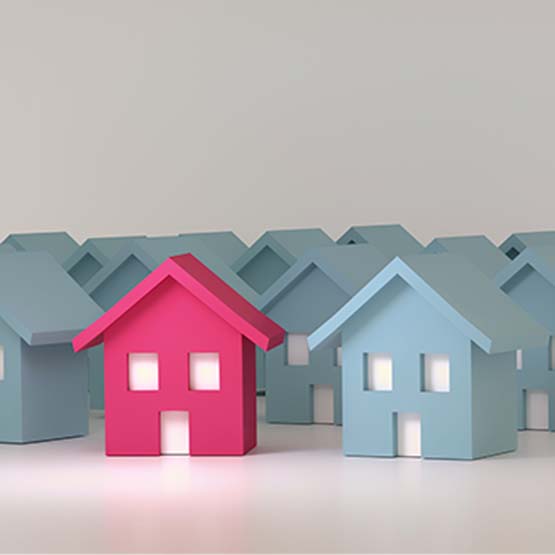We use first and third-party cookies for analytical and statistical purposes and to show you personalised advertisements based on a profile compiled from your browsing habits (e.g. pages visited). For more information, click on our Cookie Policy. You can accept all cookies by pressing 'Accept', you can reject all cookies by pressing 'Reject', or you can customize your choice by pressing 'Manage'.
I want to move house, buy a new one, sell my current one...
What kind of home do I need: townhouse, detached house, flat...?
Moving house is very common nowadays. There are plenty of reasons for doing so: the impact of the lockdown, working from home, a growing family, leaving the parental home, etc.
You may be looking for something bigger with more rooms, or you might want more parks on your doorstep, or a little terrace, or something smaller; it all depends on your stage of life and current circumstances.
Selling one house to buy another, using an agency or doing it on your own, choosing a mortgage... which mortgage? You're going to be faced with many questions.
Here we explain everything you need to know about moving house and the implications involved. Make yourself comfortable!

What steps should you bear in mind when selling a house?
Typically, if you are already a homeowner, before you buy a new house, flat or any other type of home, you will have to sell the one you currently live in. You can do this yourself privately or through an estate agency.
Between individuals, you will have to…
- Value the property. You can compare your property with similar ones in the area, use a valuation agency or, as is often the case, arrange the valuation through the bank using a mutually agreed appraiser. Alternatively, you can use an online tool to value your property. It's a good idea to get more than one opinion.
- Prepare the sale documents: property registry filling, energy certificates, plans, certificate of occupancy, property tax receipts, building survey, deeds, latest utility bills, zero debt certificate with the residents' association, etc.
- Advertise the sale: on real estate websites, social media, posters, etc.
- Show the house to visitors. It's useful to schedule the visits so you don't waste too much time.
- Negotiate the conditions with the buyer. It's crucial to listen to the buyer's budget, assess their expectations and needs, and leave what was once your home in good hands.
- Earnest money: Draw up an earnest money contract as a reservation and guarantee of purchase.
- Sign on the dotted line: Sign over the deeds at the notary's office chosen by the buyer. We highly recommend using a professional (agency or lawyer) to facilitate certain procedures.
If you are using an agency, you will have to...
- Value your property yourself. You can either compare your property to similar ones in the area or have it valued professionally.
- Choose a valuation agency and check the fees. It's a good idea to compare the services of different agencies before you decide on one in particular. You'll find traditional agencies and virtual agencies (PropTech). You can also consult online forums or ask someone who has previously sold their property.
- Negotiate the conditions and services (bearing in mind any exclusivity conditions, whether you want the basic or premium pack of services, etc.) and then sign the purchase order. This document will state the services and conditions to be provided by the agency and the price.
- Agree which documents the agency will process: property registry filling, energy certificates, plans, certificate of occupancy, property tax receipts, building survey, deeds, latest utility bills, zero debt certificate with the residents' association, etc.
- Choose your preferred purchase offer.
- Sign the deeds of sale at a notary's office, possibly accompanied by your estate agent.
- Pay the estate agency fee (traditional agencies charge between 3% and 7% of the property price, whereas in the case of an online agency you will pay between €1,000 and €5,000).
Why might you want to buy a second home?
- You need more or less space. The home you lived in when you were single is too small if you are thinking of starting a family... Or the opposite: if your grown-up children have moved out you might want something smaller.
- Features of the home. In the wake of the pandemic, you may be looking for a property with more facilities, a garden, a pool, a garage, a space to be able to work from home...
- Your work situation. If you are retiring soon, you may be thinking about a second home by the sea. Or maybe you've found a better job in another city and you want to move.
- Your age. If you're not as fit as you once were and there's no life in your building, you may need a more comfortable home with better access.
- Your tastes. Maybe you want to build your own house on its own plot of land to match your tastes.

What about a mortgage?
Variable-rate mortgage
- How it works: varies and is revised depending on the market
- Interest Rate: Euribor + spread
- Monthly instalment: variable
- Payment review: every 12 months
Fixed-rate mortgage
- How it works: your monthly payments are the same throughout the whole of your mortgage.
- Interest Rate: fixed
- Monthly instalment: fixed
- No payment reviews
Mixed mortgage
- How it works: it is fixed during the initial years and then variable
- Interest Rate: fixed at the start and then variable
- Monthly instalment: fixed and variable
- Payment review: for the variable part every 12 months